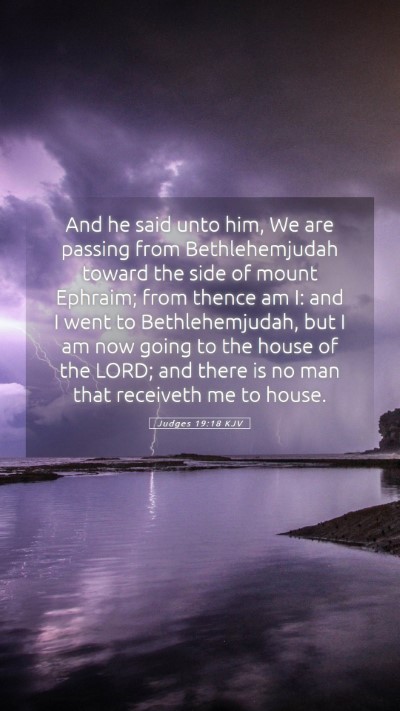Understanding Judges 19:18 - A Comprehensive Study
The verse Judges 19:18 is part of a narrative that unfolds profoundly within the book of Judges, a time in Israel's history marked by societal chaos and moral decline. Through the insights from various public domain commentaries, we can delve into a rich understanding of this verse.
Verse Text
Judges 19:18: "And he said unto him, We are passing from Bethlehemjudah to the side of mount Ephraim; from thence am I: and I went to Bethlehemjudah to the house of the Lord; and I am now going to my house; and there is no man that receives me to house."
Context and Background
This passage belongs to a story that discusses hospitality, safety, and the societal norms during the period of judges. The events focus on a Levite who journeys with his concubine, revealing much about the ethical state of the Israelite community.
Insights from Commentaries
-
Matthew Henry:
Henry underscores the severe lack of hospitality that characterized this era. He stresses the importance of welcoming strangers and how the Levite's experience highlights a decline in moral values, contrasting the expected hospitality for a Levite, a religious figure.
-
Albert Barnes:
Barnes elaborates on the geographical references, explaining how the Levite's journey from Bethlehem to the house of the Lord indicates a deep connection to worship. This journey metaphorically suggests a quest for communion with God amidst a backdrop of disarray.
-
Adam Clarke:
Clarke provides a historical context, noting that during this time, there was no king in Israel, which led to each person doing what was right in their own eyes. This verse exemplifies the chaos that ensued without centralized moral authority.
Key Themes
-
The Need for Hospitality:
The lack of welcoming behavior depicted in this verse indicates a significant cultural issue. In biblical times, hospitality was paramount—it represented not just kindness but also community ethics.
-
Isolation and Vulnerability:
The Levite and his concubine faced loneliness and danger as they navigated a land that had strayed from God's commands. This highlights the broader theme of vulnerability within human communities when moral codes are abandoned.
-
Spiritual Journey:
The Levite's pilgrimage from Bethlehem to his home symbolizes a spiritual quest. His mention of visiting the house of the Lord suggests a desire for divine connection that contrasts starkly with the responses he receives.
Application for Today
For contemporary readers, Judges 19:18 encourages introspection regarding our approach to hospitality. In an increasingly disconnected world, this verse compels us to evaluate how we treat others, especially strangers and those in need.
Conclusion
This passage serves as a cautionary tale, reminding us of the moral obligations we hold within our communities. The stagnation of hospitality during the time of the judges is a reflection of broader societal health that still resonates today.
Cross References
- Genesis 19:1-3 - The story of Lot and his hospitality towards strangers.
- Matthew 25:35 - Jesus teaches about welcoming strangers and the significance of hospitality.
- Hebrews 13:2 - Encouragement to entertain strangers, as it may be angels unaware.


